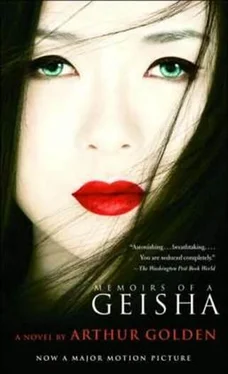I could see little of the city as we neared Kyoto Station. But then to my astonishment, I caught a glimpse of rooftops reaching as far as the base of hills in the distance. I could never have imagined a city so huge. Even to this day, the sight of streets and buildings from a train often makes me remember the terrible emptiness and fear I felt on that curious day when I first left my home.
Back then, around 1930, a fair number of rickshaws still operated in Kyoto. In fact, so many were lined up before the station that I imagined no one went anywhere in this big city unless it was in a rickshaw-which couldn’t have been further from the truth. Perhaps fifteen or twenty of them sat pitched forward onto their poles, with their drivers squatting nearby, smoking or eating; some of the drivers even lay curled up asleep right there in the filth of the street.
Mr. Bekku led us by our elbows again, as if we were a couple of buckets he was bringing back from the well. He probably thought I’d have run away if he’d let go of me a moment; but I wouldn’t have. Wherever he was taking us, I preferred it to being cast out alone into that great expanse of streets and buildings, as foreign to me as the bottom of the sea.
We climbed into a rickshaw, with Mr. Bekku squeezed tightly on the bench between us. He was a good deal bonier under that kimono even than I suspected. We pitched back as the driver raised the poles, and then Mr. Bekku said, “Tominaga-cho, in Gion.”
The driver said nothing in reply, but gave the rickshaw a tug to get it moving and then set off at a trot. After a block or two I worked up my courage and said to Mr. Bekku, “Won’t you please tell us where we’re going?”
He didn’t look as if he would reply, but after a moment he said, “To your new home.”
At this, my eyes filled with tears. I heard Satsu weeping on the other side of Mr. Bekku and was just about to let out a sob of my own when Mr. Bekku suddenly struck her, and she let out a loud gasp. I bit my lip and stopped myself so quickly from crying any further that I think the tears themselves may have come to a halt as they slid down my cheeks.
Soon we turned onto an avenue that seemed as broad as the whole village of Yoroido. I could hardly see the other side for all the people, bicycles, cars, and trucks. I’d never seen a car before. I’d seen photographs, but I remember being surprised at how… well, cruel , is the way they looked to me in my frightened state, as though they were designed more to hurt people than to help them. All my senses were assaulted. Trucks rumbled past so close I could smell the scorched rubber odor of their tires. I heard a horrible screech, which turned out to be a streetcar on tracks in the center of the avenue.
I felt terrified as evening settled in around us; but I was never so astonished by anything in my life as by my first glimpse of city lights. I’d never even seen electricity except during part of our dinner at Mr. Tanaka’s house. Here, windows were lit along the buildings upstairs and down, and the people on the sidewalks stood under puddles of yellow glow. I could see pinpoints even at the far reaches of the avenue. We turned onto another street, and I saw for the first time the Minamiza Theater standing on the opposite side of a bridge ahead of us. Its tiled roof was so grand, I thought it was a palace.
At length the rickshaw turned down an alleyway of wooden houses. The way they were all packed together, they seemed to share one continuous facade-which once again gave me the terrible feeling of being lost. I watched women in kimono rushing around in a great hurry on the little street. They looked very elegant to me; though, as I later learned, they were mostly maids.
When we came to a halt before a doorway, Mr. Bekku instructed me to get out. He climbed out behind me, and then as if the day hadn’t been difficult enough, the worst thing of all happened. For when Satsu tried to get out as well, Mr. Bekku turned and pushed her back with his long arm.
“Stay there,” he said to her. “You’re going elsewhere.”
I looked at Satsu, and Satsu looked at me. It may have been the first time we’d ever completely understood each other’s feelings. But it lasted only a moment, for the next thing I knew my eyes had welled up with tears so much I could scarcely see. I felt myself being dragged backward by Mr. Bekku; I heard women’s voices and quite a bit of commotion. I was on the point of throwing myself onto the street when suddenly Satsu’s mouth fell open at something she saw in the doorway behind me.
I was in a narrow entryway with an ancient-looking well on one side and a few plants on the other. Mr. Bekku had dragged me inside, and now he pulled me up onto my feet. There on the step of the entryway, just slipping her feet into her lacquered zori, stood an exquisitely beautiful woman wearing a kimono lovelier than anything I’d ever imagined. I’d been impressed with the kimono worn by the young bucktoothed geisha in Mr. Tanaka’s village of Senzuru; but this one was a water blue, with swirling lines in ivory to mimic the current in a stream. Glistening silver trout tumbled in the current, and the surface of the water was ringed with gold wherever the soft green leaves of a tree touched it. I had no doubt the gown was woven of pure silk, and so was the obi, embroidered in pale greens and yellows. And her clothing wasn’t the only extraordinary thing about her; her face was painted a kind of rich white, like the wall of a cloud when lit by the sun. Her hair, fashioned into lobes, gleamed as darkly as lacquer, and was decorated with ornaments carved out of amber, and with a bar from which tiny silver strips dangled, shimmering as she moved.
This was my first glimpse of Hatsumomo. At the time, she was one of the most renowned geisha in the district of Gion; though of course I didn’t know any of this then. She was a petite woman; the top of her hairstyle reached no higher than Mr. Bekku’s shoulder. I was so startled by her appearance that I forgot my manners-not that I had developed very good manners yet-and stared directly at her face. She was smiling at me, though not in a kindly way. And then she said:
“Mr. Bekku, could you take out the garbage later? I’d like to be on my way.”
There was no garbage in the entryway; she was talking about me. Mr. Bekku said he thought Hatsumomo had enough room to pass.
“You may not mind being so close to her,” said Hatsumomo. “But when I see filth on one side of the street, I cross to the other.”
Suddenly an older woman, tall and knobby, like a bamboo pole, appeared in the doorway behind her.
“I don’t know how anyone puts up with you, Hatsumomo-san,” said the woman. But she gestured for Mr. Bekku to pull me onto the street again, which he did. After this she stepped down into the entryway very awkwardly-for one of her hips jutted out and made it difficult for her to walk-and crossed to a tiny cabinet on the wall. She took from it something that looked to me like a piece of flint, along with a rectangular stone like the kind fishermen use to sharpen their knives, and then stood behind Hatsumomo and struck the flint against the stone, causing a little cluster of sparks to jump onto Hatsumomo’s back. I didn’t understand this at all; but you see, geisha are more superstitious even than fishermen. A geisha will never go out for the evening until someone has sparked a flint on her back for good luck.
After this, Hatsumomo walked away, using such tiny steps that she seemed to glide along with the bottom of her kimono fluttering just a bit. I didn’t know that she was a geisha at the time, for she was worlds above the creature I’d seen in Senzuru a few weeks earlier. I decided she must be some sort of stage performer. We all watched her float away, and then Mr. Bekku handed me over to the older woman in the entryway. He climbed back into the rickshaw with my sister, and the driver raised the poles. But I never saw them leave, because I was slumped down in the entryway in tears.
Читать дальше












